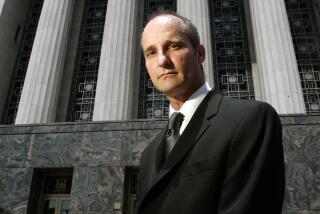S.F. Judge Seeking Federal Post Reportedly Awarded Large Fee to Meese Friend
- Share via
WASHINGTON — E. Robert Wallach, longtime friend and former lawyer of Atty. Gen. Edwin Meese III, was awarded an unusually large legal fee in 1981 by a San Francisco judge who was seeking Wallach’s help in obtaining a federal judicial appointment, government sources said Tuesday.
In a matter likely to be examined by an independent counsel already investigating Meese on several other grounds, Wallach and David B. Baum, his law partner at the time, received a $1-million fee in a case heard by then-Superior Court Judge Eugene F. Lynch. President Reagan appointed Lynch to the federal bench four months later.
The controversial fee represented 57% of a $1.74-million settlement involving two Canadian children who were badly burned in a 1977 camping accident near San Luis Obispo. It was much higher than the 25% limit usually applied in such cases.
Later Reduced
The fee, eventually reduced to $322,000 by another San Francisco judge after the children’s parents objected, is still under investigation by the California State Bar to determine whether Wallach and Baum attempted to take an excessive amount.
In a statement Tuesday, Lynch said that in 16 years on the bench, “I have never been improperly influenced in any decision by any of my many professional or social relationships with members of the Bar. . . . I know of nothing that was improper or unusual about the process of my appointment to the federal bench. I intend no further comment on this matter.”
Lynch said that he “did not finally approve the attorneys’ fees.” Referring to the subsequent reduction of the $1-million fee, he said: “I deferred determination of the amount and a different judge ultimately dealt with that matter and approved fees.”
But the judge was quoted by the San Francisco Chronicle as saying: “I would say I had about 50 people that I contacted who either contacted Sen. (S. I.) Hayakawa or contacted the White House or contacted the Justice Department or contacted Ed Meese. One of those was Bob Wallach.”
Lynch was also quoted as saying: “I don’t think it was any secret that (Wallach) and Meese were friends.”
Meese, who was counselor to Reagan at the time of Lynch’s selection, declined comment on the issue through a spokesman.
“For seven years, Mr. Meese has had a policy of not commenting on personnel matters, and he will follow that policy in this instance as well,” said Terry Eastland, the Justice Department’s director of public affairs.
An Administration source said that Wallach had written former White House personnel director E. Pendleton James on the 57-year-old Lynch’s behalf but added that he also wrote James expressing support for two other candidates for the federal judgeship vacancy.
“He was a busy letter-writer,” the Administration official said.
George Walker, Wallach’s lawyer, said that he knew nothing of Wallach’s correspondence with James.
Referring to the matter being examined by James C. McKay, the independent counsel who is investigating Meese’s ties to Wallach and other matters affecting the attorney general, Walker said: “I would think that if the special prosecutor inquired as to the professional reputation or the personal reputation of Judge Lynch, that he wouldn’t even open the book.”
Admit Relationship
Lynch and Wallach acknowledge that they are longtime acquaintances. Lynch was among the two dozen or so lawyers and judges who attended a May, 1983, lunch that Wallach hosted at Jack’s, a posh San Francisco restaurant.
At the lunch, Wallach cited his close friendship with Meese and offered to act as a conduit to the White House should any of those at the luncheon party want his aid, sources said.
Fred J. Dibernardo, a San Pedro attorney who headed Hayakawa’s search committee for appointments to the federal bench, said Lynch’s appointment “had nothing to do” with any help from Wallach.
The father of the burned children, Joel Bert, was unaware that Lynch had asked Wallach to lobby on his behalf for the federal judgeship, according to Richard R. Clifford, who now represents Bert.
“Something influenced his handling of the case because the fee he approved was unconscionable,” Clifford said. “There was no way he made an error of judgment in approving the fee. He must have known it was unconscionable.”
Ostrow reported from Washington and Morain from San Francisco.
More to Read
Sign up for Essential California
The most important California stories and recommendations in your inbox every morning.
You may occasionally receive promotional content from the Los Angeles Times.











